Tag: hebrew
-

Who or what is meant by the “ten men” of Zechariah 8:23?
Zechariah 8:23 Thus says the LORD of hosts: In those days ten men from the nations of every tongue shall take hold of the robe of a Jew, saying, ‘Let us go with you, for we have heard that God is with you.’” (ESV) Who or what is bei…
-

How should the Hebrew ‘ehyeh asher ehyeh’ in Exodus 3:14 be translated in English and what does it mean?
God instructed Moses to say “I AM WHO I AM. This is what you are to say to the Israelites: ‘I AM has sent me to you’” (Exodus 3:14 New International Version). The phrase translated “I am who I am” in Hebrew is ehyeh asher ehyeh. The word e…
-

Search English word (ex: “carve” in Hebrew) and return each occurrence in The Bible
I want to type in "carve" and show everywhere that Hebrew term appears in The Bible. Any websites do this? 2) Also, where can I open the concordance and simply scroll down the words listing? Thank you
-

How long was the weeping of Tammuz?
In the book of Ezekiel, it describes women weeping for the god, Tammuz, in the Temple. I’ve heard that supposedly the weeping lasted for only a couple of days, while others say it lasted for the month named after him. Also, I’ve heard that…
-
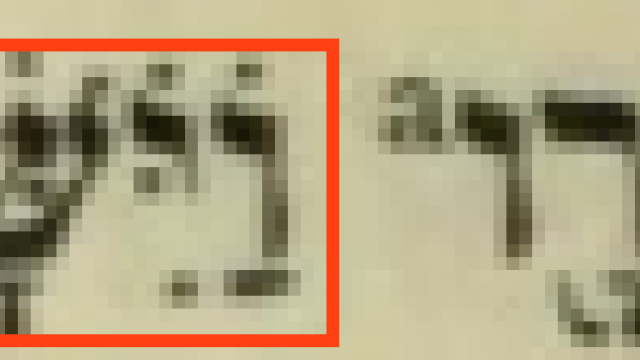
Why are there extra dots in Genesis 33:4?
I was reading Genesis 33 and noticed extra dots (i.e. not part of the niqqud that I understand) above the letters of “and he kissed him” in verse 4 (picture from archive.org’s Biblia Hebraica): and he fell on his neck and kissed him, and…
-

transcriptions of the OT and NT texts
Can you advise where to find transcriptions (i.e. pronunciation, e.g. dawar; I don’t mean transliteration – dābār) of the hebrew (OT) and greek (NT) texts?
-

How best to understand the NLT translation of Malachi 2:16?
Malachi 2:16 NLT “For I hate divorce!” says the Lord, the God of Israel. “It is as cruel as putting on a victim’s bloodstained coat,” says the Lord Almighty. “So guard yourself; always remain loyal to your wife.&q…
-

Why does the KJV say JAH in Psalm 68:4?
While reading Psalm 68 this morning, I came across this verse which uses the name “JAH”: Sing unto God, sing praises to his name: extol him that rideth upon the heavens by his name JAH, and rejoice before him. (KJV Psalm 68:4) …
-

Hebrew meaning of “between evenings”
I’m trying to understand a phrase in Exodus 29:39 and Numbers 28:4. The phrase is “בין הערבים.” This seems to literally mean “between evenings.” It is present here in the language of sacrificing two lambs daily. One …
-

Understanding the appropriation of Psalm 22:2 in the Gospel crucifixion accounts
In Matthew 27:46, the author quotes Jesus, first transliterating his words with Greek letter (NA28 | ESV): ηλι ηλι λεμα σαβαχθανι; Eli, Eli, lema sabachthani? He then translates into Greek: Θεέ μου θεέ μου, ἱνατί με ἐγκατέλιπες…
-

Is the verb in Joshua 2:1 meant to indicate that the spies were clients of Rahab’s harlotry?
Joshua 2:1 recounts the journey of the Israelite spies in Jericho: וַיֵּ֨לְכוּ וַיָּבֹאוּ בֵּית־אִשָּׁ֥ה זוֹנָה וּשְׁמָהּ רָחָב וַיִּשְׁכְּבוּ־שָמָּה And they went and came into the house of a prostitute whose name was Rahab and l…
-

Were the teraphim (household gods) Rachel stole from Laban like a deed to his property?
While there are several questions related to this occurrence in Gen. 31:19, none seem to mention this as even possible. It was also not mentioned in a resent commentary I read. That the teraphim acted as a property deed was the answer gi…
-

Were the teraphim (household gods) Rachel stole from Laban like a deed to his property?
While there are several questions related to this occurrence in Gen. 31:19, none seem to mention this as even possible. It was also not mentioned in a resent commentary I read. That the teraphim acted as a property deed was the answer gi…
-

Greek: Jerusalem, why is this sometimes plural?
I’m trying to understand the use of the city name Jerusalem in the New Testament. In some places, it appears as a proper noun, singular, feminine (Strongs 2419), And then in other places, it appears with neuter plural declension (Strongs …
-

Is Ecclesiastes 8:10 about pretentiously deceptive followers of God Or just the customary funeral ceremony that most of the dead undergo?
8:9-11 The Westminster Leningrad Codex 9 אֶת־כָּל־זֶ֤ה רָאִ֙יתִי֙ וְנָת֣וֹן אֶת־לִבִּ֔י לְכָֽל־מַעֲשֶׂ֔ה אֲשֶׁ֥ר נַעֲשָׂ֖ה תַּ֣חַת הַשָּׁ֑מֶשׁ עֵ֗ת אֲשֶׁ֨ר שָׁלַ֧ט הָאָדָ֛ם בְּאָדָ֖ם לְרַ֥ע לֽוֹ׃ 10 וּבְכֵ֡ן רָאִיתִי֩ רְשָׁעִ֨ים קְבֻרִ֜ים…
-

Why is Hosea 14:2 changed in some translations?
I’ve read that in Hosea 14:2, the reference to sacrificial bulls is removed and the word פָרִ֖ים is mistranslated as "fruit". Why is this? https://biblehub.com/hosea/14-2.htm#lexicon
-

Tithing in the churches today
Q. Why are there so many debates about tithing today? JC Pennys’ chain of malls in America has the testimony of tithing; why is it negated today? Looking unto Abraham, he gave a tithe, Jacob vowed and gave a tithe, even before Moses came a…
-
Should the participle-clause in Song 6:10 be perceived more as “describing/nonrestrictive” or “defining/restrictive”?
Song of Songs 6:9b-10 presents the women of the royal court catching sight of the new bride before the wedding, and being so impressed that they declare her praise and blessedness with the following words (verse 10): מִי זֹאת הַנִּשְׁקָפָ…
-

-

June 19th Is The 23rd Of Sivan In The Hebrew Calendar, And What Happened On That Day In The Book Of Esther May Portend The Next Phase Of Israel’s War With Iran
In the book of Esther, King Ahasuerus on Sivan 23 issued the decree authorizing the Jews to defend themselves against their enemies, June 19th is Sivan 23. Sometimes in the Bible you find an amazing nugget, other times you find some fascinating coincidence. This one from the book of Esther is one of those two…
-

What does the word “mishkav” mean in Biblical Hebrew
I do NOT mean "bed". But rather how it is being used in some specific verses: Num. 31:17, 18, & 35; Jdgs.12:11 & 12; Ezk 23:17) What does the word "mishkav" as mentioned ONLY in Num. 31:17,18, & 35; Jdgs.21:…
-

Is εἰρήνη ὑμῖν (peace be with you) in John 20:19 Jesus using the common greeting שָׁלוֹם לָכֶם (shalom lachem) in the first century?
To clarify this question, I am asking if שָׁלוֹם לָכֶם (shalom lachem) was a common greeting in the first century? εἰρήνη would normally be translated שָׁלוֹם ὑμῖν — the dative as used here would be translated with לָ and the 2nd person p…
-

Sanctified or being sanctified Hebrew 10:14
Focusing purely on the Greek grammar is it saying those who are being sanctified or those who are sanctified? μια γαρ προσφορα τετελειωκεν εις το διηνεκες τους αγιαζομενους
-

Does anyone have insight into the Hebrew idiom; “Prince of Peace?
Yeshayahu (Isaiah) 9:6 is debated with regards to the subject being described i.e. Hizqiyah or Mashiach and that is not something I’m looking to get an answer/opinion on. I have heard that the term; "Prince of peace" is an idiom…
-

“For it was without number” – Numeral system in the time of Genesis 41
Genesis 41:49 (King James Version) And Joseph gathered corn as the sand of the sea, very much, until he left numbering; for it was without number. Without being a perfect equivalent, this english version is very close to the fren…
-

Is El-Shaddai “Sky God” where Sky=Breasts?
I found the name “El-Shaddai” mysterious, but while going over Genesis, found the following passage (Gen 49) Wikisource translation From the god of your fathers, and he will help you, and the Shaddai, and He will bless you, blessing on…
-

In Psalm 22:21 is the Bible speaking of “unicorns”?
I was reading Psalm 22 (from this question) and I found this verse: Psalms 22:21 (KJV) Save me from the lion’s mouth: for thou hast heard me from the horns of the unicorns. When I switched translations I found “wild oxen” instead: …
-
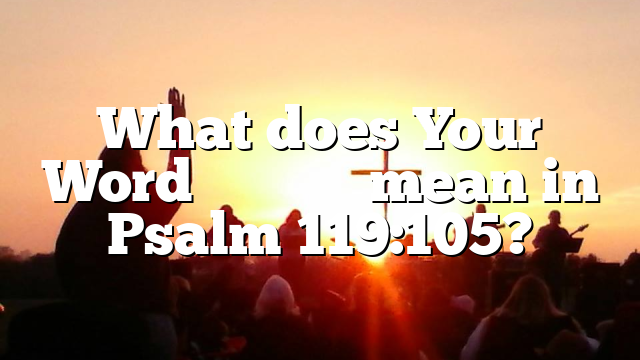
What does Your Word דְבָרֶ֑ךָ mean in Psalm 119:105?
Your word is a lamp to my feet and a light to my path. (ESV) has similar wording to John 1:1,4. In the beginning was the Word… In him was life, and the life was the light of men. (ESV) Is there any connection? The traditional in…
-

The Hebrew Reaction to Trouble | Perry Stone
Using a Hebrew word study, discover the word TROUBLE and the amazing Hebrew nugget that will change your understanding of your TROUBLE! #perrystone #treasurebook…
-

What is the meaning of the Hebrew word כארו as used in Psalm 22:17?
In the book "Vetus Testamentum Hebraicum : cum variis lectionibus" Kennicott, Benjamin, a comparison of manuscripts with the Masoretic text is given, of which more than 600. https://archive.org/details/kennicott_vetus-testamentum…
-

Translation of רַבָּֽה “rabbāh” in Psalm 62
In Psalm 62, verses 2 and 6 differ in just one word, רַבָּֽה rabbāh, at the end of the verse. This is glossed as “great(ly)”, “much”, and the like. Many translations render it as modifying the preceding verb: NASB “I will not be greatly sh…
-

Question with regard to dual meanings in the Hebrew words “Erev” and “Boker” in Genesis 1
This is a long and sometimes rambling account of my investigation into the creation account, specifically with regard to the word “Boker” or morning. It is one of the most fascinating concepts I have ever discovered with regard to the Tora…
-

What translation philosophies have caused such a wide variation in the translation of *tachash* skins?
In Exodus (e.g. 26:14), we learn one of the coverings for the tabernacle is to be made of “תחש” (tachash) skins. The translation of this term appears to be especially difficult or contentious as there is little consensus between translatio…
-
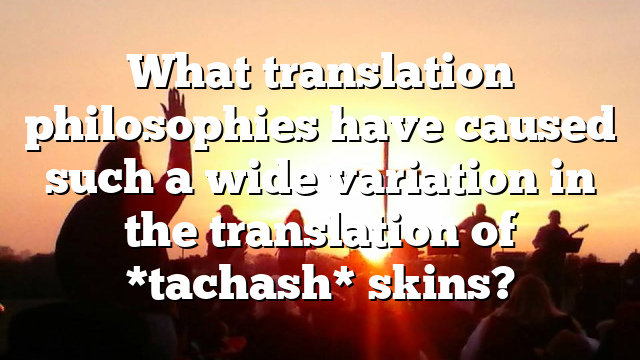
What translation philosophies have caused such a wide variation in the translation of *tachash* skins?
In Exodus (e.g. 26:14), we learn one of the coverings for the tabernacle is to be made of “תחש” (tachash) skins. The translation of this term appears to be especially difficult or contentious as there is little consensus between translatio…
-

How can I identify puns in the Hebrew Bible?
The Bible sometimes uses words with multiple meanings to the effect of an intentional pun or wordplay. Punning seems especially common in Hebrew. I think that being aware of these literary devices offers an important insight into the ton…
-

Can ‘face of his father’ refer to human sacrifice in Gen. 11:28?
Gen. 11:28 says that Haran died in the face (פְּנֵ֖י) of his father. I’m wondering if this is a euphemism for human sacrifice, that Haran was a sacrifice to gods sort of the way Isaac was later almost a human sacrifice. I know nothing of…
-

At Hebrew University: ‘With spirit and blood we will redeem Al-Aqsa’
Israel National News reports: “On Tuesday at the Hebrew University in Jerusalem, a ‘protest strike against the genocide and massacre in Gaza’ took place, which turned into a pro-Palestinian demonstration initiated by the Hadash cell […] The post At Hebrew University: ‘With spirit and blood we will redeem Al-Aqsa’ appeared first on JVIM.
-
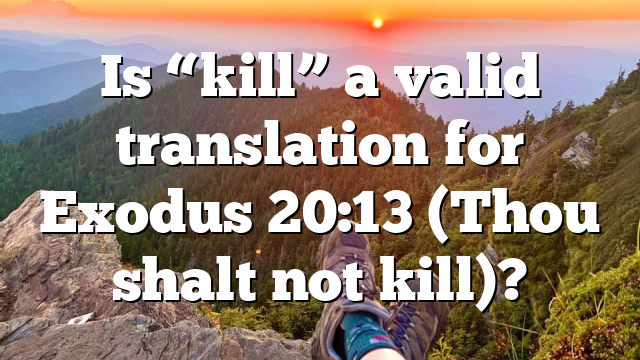
Is “kill” a valid translation for Exodus 20:13 (Thou shalt not kill)?
Exodus 20:13 (KJV) Thou shalt not kill. Many political statements have been made about this verse. This translation has been used by many to support their pacifist desires. However, it seems that most translations have dropped "ki…
-

How many people were involved in the Exodus?
According to Numbers 1:20-46 (NJPS): They totaled as follows: The descendants of Reuben, Israel’s first-born, the registration of the clans of their ancestral house, as listed by name, head by head, all males aged twenty years and ov…
-

In Psalm 40:12: is he surrounded by “evils” or by “iniquities”?
Psalm 40:12 (KJV) ” For innumerable evils have compassed me about: mine iniquities have taken hold upon me, so that I am not able to look up; they are more than the hairs of mine head: therefore my heart faileth me.” Is it possi…
-

‘Al-Quds will be in the hands of the Muslims’ – Ayatollah Khamenei tweets in Hebrew
The Jerusalem Post reports: “Iran’s supreme leader, Ayatollah Ali Husseini Khamenei, wrote a message in Hebrew saying, ‘Holy Al-Quds will be in the hands of the Muslims, and the Muslim world will celebrate the liberation […] The post ‘Al-Quds will be in the hands of the Muslims’ – Ayatollah Khamenei tweets in Hebrew appeared first…
-
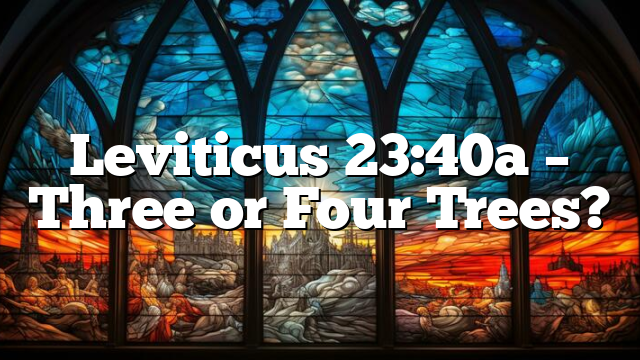
Leviticus 23:40a – Three or Four Trees?
In the instructions for building booths on the feast of Tabernacles in Leviticus 23.40: וּלְקַחְתֶּם לָכֶם בַּיֹּום הָרִאשֹׁון פְּרִי עֵץ הָדָר כַּפֹּת תְּמָרִים וַעֲנַף עֵץ עָבֹת וְעַרְבֵי נָחַל וּשְׂמַחְתֶּם לִפְנֵי יְהוָה אֱלֹהֵיכֶם ש…
-

What word best captures the spirit of לִּילִית in Isaiah 34:14?
Isaiah 34:14 in the Masoretic Text is the following: גְשׁוּ צִיִּים אֶת-אִיִּים, וְשָׂעִיר עַל-רֵעֵהוּ יִקְרָא; אַךְ-שָׁם הִרְגִּיעָה לִּילִית, וּמָצְאָה לָהּ מָנוֹח Here, לִּילִית is supposedly the only known mention of “lilith” in …
-

What does it mean עָלַ֤ to be used instead of אֶל in 1 Chronicles 22:8?
1 Chronicles 22: 8 But the word of the LORD came to me, saying, Thou hast shed blood abundantly, and hast made great wars: thou shalt not build an house unto my name, because thou hast shed much blood upon the earth in my sight. The &…
-

Why did John use the name Nicodemus, a Greek name, instead of his Hebrew name in John 3:1?
νικάω … 1. intr. be victor, prevail, conquer… 2. trans. conquer, overcome, vanquish… — Arndt, W., Gingrich, F. W., Danker, F. W., & Bauer, W. (1979). In A Greek-English lexicon of the New Testament and other early Christian lit…
-

Would ἀγάπη in 1 Cor. 13 be better translated חֶסֶד in Hebrew translations rather than אַהֲבָה?
I hope we can tolerate a translation question into another language besides English, especially since some people here know Hebrew. It is even the 1st language for some here. אַהֲבָה is the most common word for love in Hebrew, but it also…